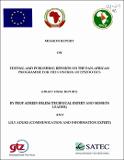EDITING AND PUBLISHING REPORTS ON THE PAN-AFRICAN PROGRAMME FOR THE CONTROL OF EPIZOOTICS

(en=English; ar=Arabic; fr=French; pt=Portuguese)
Authors
African Union Inter-African Bureau for Animal Resources
AU-IBAR
Type
ReportItem Usage Stats
92
views
views
36
downloads
downloads
Abstract
A short term consultancy has been contracted by the German Technical Cooperation/International Service (GTZ/IS) — SATEC Developpement International and the African Union — Inter-African Bureau for Animal Resources (AU/IBAR) with the main objective to compile, edit and publish the main documents, reports and lessons learnt from the Pan African Programme for the Control of Epizootics (PACE) Programme. Initially, this work was supposed to build upon the outcome of an earlier consultancy on PACE documentation. However, constraint of time has led to a concomitant execution of the two missions. Planned, initially for 20 days, the mission of editing and publishing the reports on PACE has been conducted for 27 days, at the PACE Coordination Unit in Nairobi. The PACE programme, which was a major development programme in the field of animal health covered 30 African countries. It was originally planned to cover 32 countries but, because of their economic and political situation, Sierra Leone and Liberia did not continue in the programme. The programme was designed to last 5 years, from November 1999 to October 2004. However a mid-term evaluation (MTE), which was conducted in 2002 concluded that, as a result of the PACE Programme having suffered many delays in the first two years of its implementation, barely half the participating countries could have completed more than two years of their projected five-year programmes of capacity building. Therefore, the management of the programme has executed the recommendation of the MTE to extend the activities of the PACE Programme by two years. The PACE Programme is coordinated by the Inter-African Bureau for Animal Resources (IBAR) of the African Union (AU) ex-Organization of African Unity (OAU). A participatory approach has been adopted so that livestock farmers and animal health professionals are involved in implementing the programme All animal product consumers, as well as the national economies of the participating countries have benefited from the PACE Programme. The idea behind the PACE Programme was to build on the headway made in the campaign against Rinderpest conducted by the Pan African Rinderpest Campaign (PARC) from 1986 to 1999 to establish lower-cost national and continental epidemiological surveillance networks for the main animal diseases, provide the countries with the capacities needed to organize economically and technically justified control programmes and develop effective and sustainable distribution of veterinary products and services.
Collections
- PACE Documents & Reports [158]